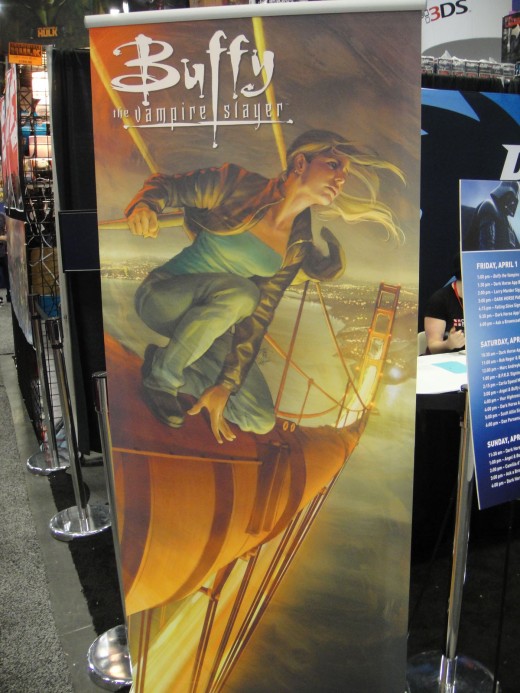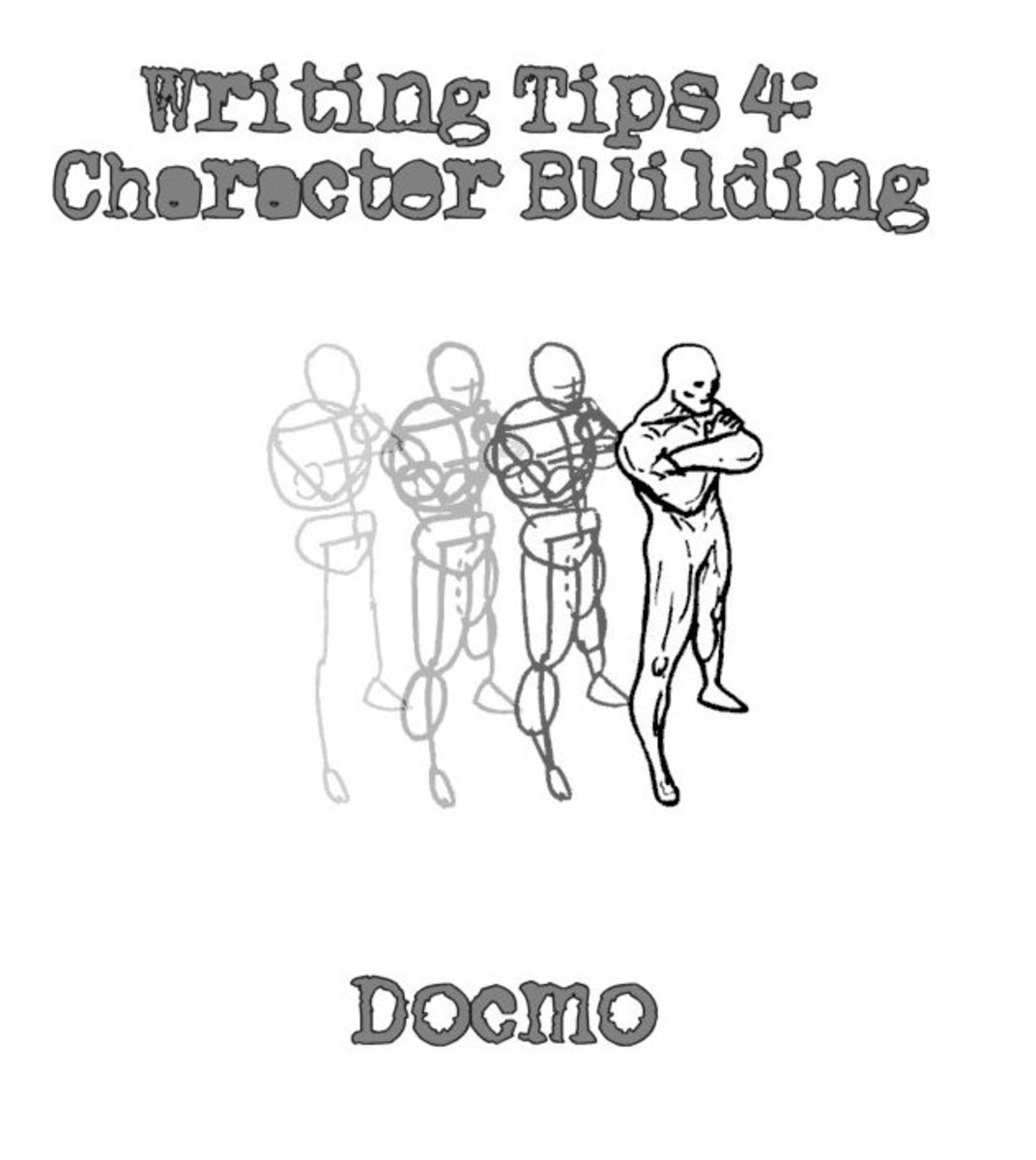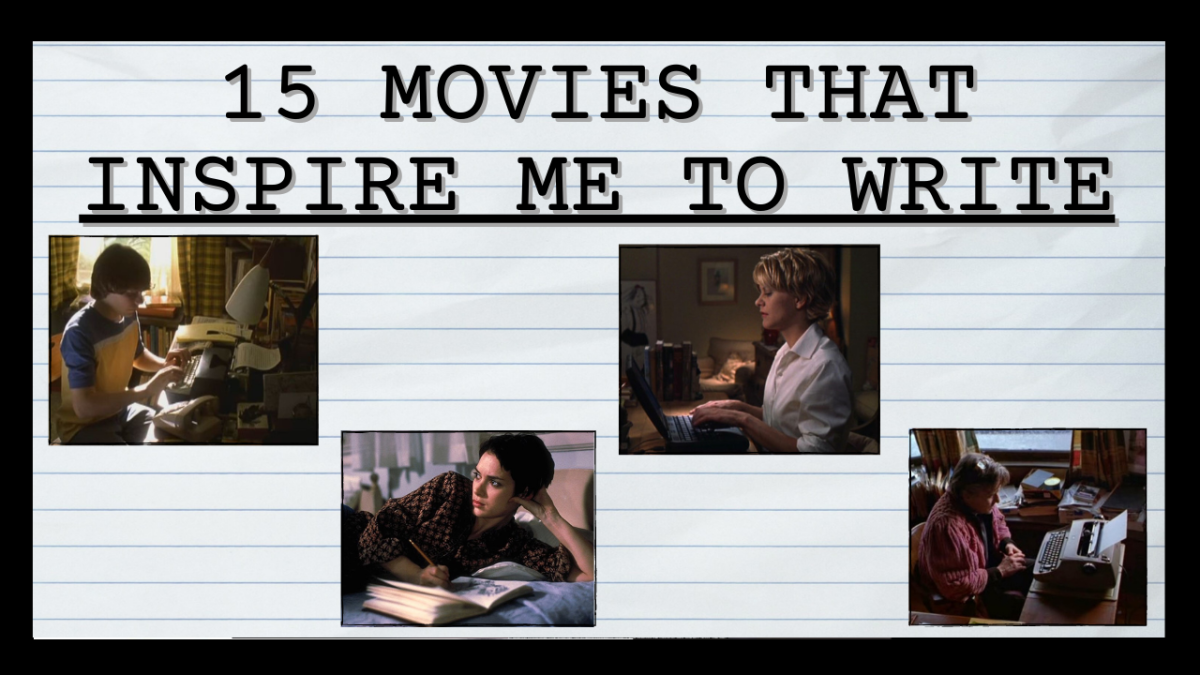What Are Mary Sues & Gary Stus and Why People Write Them
Buffy the Vampire Slayer

And Away We Go
Before I begin, remember last week’s “I.D. the Oh So Despicable Mary-Sue Character That You Just Know for Certain That It’s a Mary-Sue Character Based Solely Off of Some Random Character Traits That Are Attributed to Mary-Sue Characters?”
If you guessed Buffy, you’re right.
And yet, I know that at least 99.9% of you never ever considered her to be a Mary-Sue. Kind of shatters the MS theory, now doesn’t it? We’re going to get to that.
Part 1: Meet Mary-Sue, Gary-Stu, and Their Traits:
Most people don’t know or have a vague idea of where the original Mary-Sue comes from. Mary-Sue is a character from the fan fiction “A Trekkie’s Tale,” by Paula Smith, back in 1974 (wow, fanfic isn’t a new phenomenon then, huh?). Mary-Sue is a fifteen and a half year old girl and the youngest lieutenant in the fleet. She’s extraordinarily smart, can befriend everybody, very mature for her age, can save the day pretty much any day, happens to be a half-breed of some sort (in this instance I think she was half Vulcan,) can free everybody from a dungeon using things like bobby pins—in other words, she’s MacGuyver before there was MacGuyver—and then dies so everyone grieves and proclaim their greatest admiration for her.
This is Paula Smith’s scathing response to the stories that young fanfic writers were submitting to her magazine, calling to attention their clichéd original characters (later I’ll refer to them as OCs) and the characters absolutely flawless personalities.
I think she’s full of crap.
I do fully understand what a true Mary-Sue and Gary-Stu is. I agree that they can be tiresome and obnoxious, but I believe that there are hundreds of OCs out there that have all of these qualities and still turn out to be awesome characters.
But let’s start at examining the full list of MS and GS traits—many of which are absolutely identical—that I could dig up:
· Beautiful, or in the case of GS,
· Very Handsome
· Young for MSs, generally 15 to 18 years old or so
· Older for GSs, generally 25 to 35 years old or so
· Extremely talented in:
· Martial arts
· Magic
· Mutant powers
· Weaponry, i.e. sword
· Sometimes dies at the end of the story
· Is considered a wish-fulfillment fantasy for the author, or
· A veiled attempt at the author’s self-insertion into the story
· Mature for their age
· If a GS then usual has a tragic history
· Upstages canon characters
· Everyone likes them
· One of the canon characters falls in love with them, often the main character
· Totally without flaws
· Almost unbeatable
· Clever
· Witty
· Bad guys are afraid of them
· Is the child of one of the characters, or a brother/sister/cousin/long lost father/long lost mother/long lost relative of some sort/a clone/a loved one back from the freakin’ dead, whatever
· Has a name with a particular meaning
· Everybody agrees with them
· Generally happy and friendly
· Brave
· Super strong
· No backstory or a backstory that is vague
· Unusual physical attribute, i.e.:
· Strange eye color
· Scars
· Debilitating injury (that’s covered more extensively in Week #4: Going Overboard With the Flaws)
· Spectacularly well endowed one way or the other
· Birthmarks
For God’s sake, I have to stop here. No wonder people are so afraid to write now!
Look, in my opinion a real Mary-Sue or Gary-Stu is the one that makes you roll your eyes, say, “Yeah, right,” then abandon the story and find something better. There are absolutely ridiculous MSs and GSs out there. I know that. I agree.
But I do not agree that every OC character that has some (SOME) of these traits is bad. I already showed you that Buffy is a MS when you break her down into just her traits and nothing else. In my opinion, a MS/GS can be a MS/GS and still be an awesome character through one thing: good writing.
But that’s for next week.
Part #2: Why People Write Them
I’ve tried to break this down a number of ways. I think I found the basic reasons:
· Self Insertion
· New to Writing
· Influenced by the media
· A need for a particular kind of character of hero
· Trying to impress their audience
· Trying to match their character to the canon characters
SELF INSERTION:
There are two kinds of self insertion: the obvious I’m-not-going-to-bother-with-hiding-it kind, and the second kind I refer to as a “veiled” insertion.
Obvious self inserts are exactly what they sound like—the author inserts themselves as a character into a story without changing their names or personalities. Sometimes this works (I’ll discuss this later), but often these stories can go overboard with the Sueism. Generally speaking, these self inserted authors are new or fairly new to writing, and the second they get a “Hey! That’s a cool idea!” for a story, they jump right to writing it.
These authors sometimes get what they believe is a clever idea to literally be a character in a canon universe. I’ve seen some Star Wars stories where the MS (referred to as such for now) is the actual author, who is either in this canon universe via always been there, got bumped on the head and woke up on Endor or wherever, had a spaceship descend into their front yard in order to be whisked away to save the galaxy, or was magically sucked into the story … you get the idea.
These ideas are so bad. Sometimes they’re funny because the author is obviously just trying to have fun and they’re not taking themselves seriously. Other authors, on the other hand, go a wee bit overboard with their character details. I’ve read stories where these authors are young Jedi Knights with power on par with Luke Skywalker’s though they have minimal training, where they’re better lightsaber duelists than Darth Maul, where Darth Maul or young Obi-Wan Kenobi falls in love with them (literally, the author, not an OC), are Luke and Leia’s long lost sibling via Darth Vader and another woman, they’re half Twi’lek and have a Ewok as a side-kick, are so good that they can’t be beaten in battle, etc. Broken up as a few bits might make this author interesting, but when you have all these kind of traits crammed together for one person, well, then this author isn’t believable. In fact, they’re kind of obnoxious. Why? Let’s get to the next part before we discuss this further.
What I called a “veiled” self insertion is where the author inserts themselves into a story but changes a few details so supposedly nobody will guess that it’s them. Not to pick on anybody, but let’s say that this person is a fourteen year old Korean girl named Jane who loves Buffy and likes to imagine herself as being a vampire slayer. This girl has two older brothers and she reads Seventeen Magazine and has a pet Yorkie. If she self inserts herself into a story but uses a veiled technique, she’ll be a fourteen year old Korean girl named JENNIE who loves Buffy and likes to imagine herself as being a vampire slayer. This girl has two older brothers and she reads Seventeen Magazine and has a pet Yorkie.
Okay, you may or may not notice those details, but you might get to wondering about it. This isn’t a big deal, but now Jennie might add that she’s a fourteen year old vampire slayer that was coincidentally called to be a slayer at the same time that Buffy was supposed to be, but Jennie started training earlier, so her martial arts are better than Buffy’s. When Buffy’s in doubt, Jennie is always ready for a fight and 100% that she’ll win. She’ll go up against the biggest and baddest monster after it has essentially demolished Buffy and her friends, and win hands down. Xander and/or Angel fall in love with her. Everybody absolutely adores her, including Cordelia.
See? Those are self insertions. Overdone self insertions, and this is what rankles so many people. The author/characters are annoying, without fault, too talented, and just sometimes too damn loveable.
Which brings me to my next point.
Having read many self insertions fics, it dawned on me one day that a lot of these stories aren’t just by newbie authors who think it’s cool to be the best—a lot of these authors are upset with something. They might be lonely, afraid, socially outcasted, nervous about romance and intimacy, teased and bullied, poor self esteem, poor self confidence, or just need to prop themselves up in order to deal with the daily insanity that is their life.
I’m not saying this is true of everybody. But I believe it’s true of a lot of author inserts. The twelve year old boy who has Darth Vader begging for mercy might be bullied at school. The fifteen year old girl who has Angel falling in love her is lonely and has a bad self image of herself, making her think that she’ll never be attractive to anyone.
It’s just a theory, one that I hope you’ll consider next time you see one of these things.
Now, for myself, I’m no stranger to self insertion. I did it for fun in my Meeting the Wolverine series (and I plan to do so again, thank you very much.) The idea came when I was complaining about how disappointing Rogue was in the first X-Men movie. My then eight year old brother piped up, “Yeah. Kara, you could have been a better Rogue than she was.”
I thought about it. What would happen if I met Wolverine instead of Rogue? It sounded like a really funny idea so I wrote the scenes where Rogue meets Wolverine in Canada, but this time it was me, and tried really hard to make my mutant powers reasonable, and I was never sure if I was successful. I did it deliberately. Therefore, self insertion. Was I crucified for it? Actually, no, I wasn’t, because I started getting lots of requests.
But a year later, I decided to take the basic idea of the Meeting the Wolverine stories and write it as an original (so to speak) fanfic. I took out myself entirely, separated the movie from the comics, but I kept the plot of a genetically manipulated mutant girl in. I gave her the same mutant traits, but changed her personality and then named her Dara Gibson. I put my author name down as Kara.
I was getting pretty good reviews for weeks, until one guy noted, “It’s a good story, but nice try on the name.”
Huh?
I went back and reread it. I didn’t get it, so I read it again.
That’s when I noticed that “Kara” and “Dara” were really similar.
I blinked a few times, then stared at the computer until the connection finally came.
“DAMN IT!!!”
I was pretty pissed off. I hadn’t even thought of it. Mom had suggested the name and I liked it and now, oh great, people think I’m self inserting … Ah well.
So, yes, that’s my big dark secret. But don’t worry, real authors have self inserted too. Stephen King did a veiled insert when he wrote The Body.
NEW TO WRITING:
This one I totally understand. Every new writer has an amazing idea in their heads, and they plan on writing just as well as any other established author. They go at it with gusto, thrilled and pleased with themselves for undertaking the task of writing The Great American Fan Fiction Novel.
The trouble is, nobody at this point knows how to write a good character. That can lead to accusations of Sueism, but relax. New writers, remember that you’re not a pro yet. Fic readers, I’m asking some of you politely to back the hell off and give these people a break.
Writing is not easy when you want to take it seriously. I’ve been writing since I was thirteen years old, and I thought I was the best writer bar none. I thought I had a natural talent for it, and that I was going to get published by the first house I sent my book to. Cold hard reality set in when I was reading other books and I realized that these people are waaaay better me.
I believe it was Stephen King’s book On Writing where he says that you can’t write until you read, and you can’t read until you learn your letters. It’s a bit boneheaded to jump over to the keyboard and pound out a story expecting everybody to love it. You don’t have the experience yet. Your characters will be considered MSs because you’ve just given them all the great things you think they need. That’s not bad, it just needs refining, which we’ll get to next week.
As for you readers—you don’t have to love the story. Just sigh and go to a different one. Don’t flame, because these people are learning how to write. Give them tips. And if you can’t do that, kindly drive your car off a bridge.
INFLUENCED BY MEDIA:
Oh wow, this is such a big topic that I’ll cover it in Week 6, but it has to be noted quickly: TV, movies, comics, video games, RP games, etc. have installed in us that any character can have a few dozen MS traits and still be cool, which always influences our writing. This creates a backlash in fanfic, which makes absolutely no sense at all. But we’ll get to that.
A NEED FOR A PARTICULAR KIND OF HERO:
As I was outlining this, it occurred to me that this actually going to be a very long topic. I’m debating if I should put in the Week 6 blog or make it a separate article. Either way, it’s too much to go over right now, especially since it’s 11:26 PM right now, I’m late posting and I’m hungry and don’t really feel like keeping this up.
Mary-Sues are more abundant than Gary-Stus. This I think we can all agree on. But my belief as that Mary-Sues are inadvertently created because our society lacks serious, admirable and enjoyable women heroes—which is why I have so many of them. I’m sure some of you are rolling your eyes and saying, “Whatever. There’s Wonder Woman.” Okay, fine. I want you to make a list of one through thirty and write down every known female hero (this excludes things like indie comics) that you know of in under one minute. You’re not allowed to go look at anything for ideas. You have to sit there and think.
Now do the same thing for the male heroes. One through thirty in under a minute. Go!
I’ll continue this later because it’s an interesting topic.
IMPRESSING THE AUDIENCE:
Some authors always feel that their characters aren’t cool enough. Too weak, too boring, too meek, too gentle, and so forth. They feel the need to amp up their characters. Their OCs have to be awesome. They’ve got to be “women want him, men want to be him” kind of character. Badass. Sexy. Funny. Bold. You can add to the list if you want.
But, again, the authors go overboard and make their OCs too spectacular. Now they’re boring and trite. This relates to Week 6 as well, so I won’t go much further.
MATCHING THE OC TO CANON CHARACTERS:
This is common and I understand why. You have a cool as hell canon character like Wolverine. You want your OC to measure up to him because, in theory, your OC could be interpreted as uninteresting to both Wolverine and the audience, or they could be seen as kind of a lead anchor, somewhat interesting but always slowing both Wolverine and the story down because they’re not as powerful.
That’s when people go a little nutty with the Sueism. If the OC is a woman, she might be tall with long legs, have long hair (red, usually), possibly be Japanese, uses the scariest weapons on the planet to fight, be phenomenally strong despite her slender build, is seductive, charms Wolverine, trades barbs with him, wears a skin tight leather suit and somehow manages to hide guns and knives on her, rides a motorcycle … but aside from that, doesn’t have a personality. The GSs are huge muscular men, taller than Wolvie, somehow related to him therefore giving them a healing factor which is actually ten times greater than Wolverine’s, mercenaries, samurais or have extensive martial arts training, quick witted and sarcastic, brave, saves Wolverine’s butt three or four times, earns Wolverine’s admiration, but otherwise is lacking in personality.
Another Week 6 blog. Sorry!
Part #3: Winding It Down:
Well, at last I’ve finished this week’s blog … only took me nearly two hours to complete it, thanks partially to my freak-out cat Mogwai, who always decides that it’s time to play when I’m working on something.
Skimming through the blog again, everything looks fine but I hope it’s not too convoluted. Again, I’ll appreciate any feedback, responses, tips and suggestions and any links that you may come across.
Now to put the Cone of Silence back on Mogwai.









